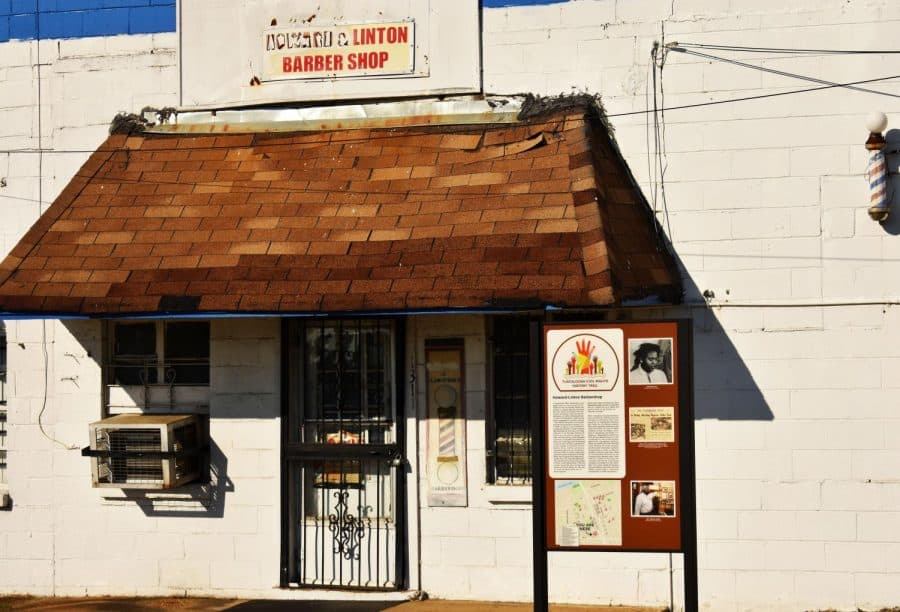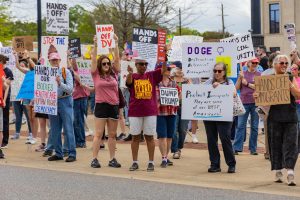‘He made us feel like we were the movement’: Community remembers civil rights legend
When Autherine Lucy Foster became the first African American student to enroll at The University of Alabama in February 1956, she was attacked by a mob of white citizens and students. Rev. Thomas Linton provided her with shelter in his barbershop on T.Y. Rogers Jr. Avenue. CW / Kelby Hutchison
June 23, 2020
After spending his life fighting for the rights of African Americans and spreading the word of the gospel, Reverend Thomas Linton died May 14, 2020, at the age of 88.
During a time in Tuscaloosa when many store owners were Ku Klux Klan members and when Black pastors faced threats, Linton felt called to become a civil rights activist.
Linton left an impact on the city of Tuscaloosa as a key figure in the civil rights movement. He was “instrumental in every major positive event that led to the end of segregation in West Alabama,” said UA history professor John Giggie.
When Autherine Lucy Foster became the first African American student to enroll at The University of Alabama in February 1956, she was attacked by a mob of white citizens and students. Linton provided her with shelter in his barbershop, and he arranged for her safe transportation back home while calling in someone to help fix Lucy’s hair after students had thrown eggs in it.
Watch below: Reverend Thomas Linton; “We Understood Then That We Had Some Power”, a documentary produced by UA Honors College students under the guidance of instructor Billy Field
As one of the three first lieutenants under Reverend T.Y. Rogers during the Civil Rights Movement, Linton bailed out protestors, paid medical bills and offered advice to the younger generation at his barbershop. He fought to integrate Tuscaloosa workplaces through his involvement with the Tuscaloosa Citizens for Action Committee and the Tuscaloosa Human Relations Committee.
“He always came to the young people and said encouraging things and made us feel like we were so important to the movement,” said Harrison Taylor, a foot soldier under Linton during the Civil Rights Movement in Tuscaloosa. “You know, sometimes people take young folks for granted, but he made us feel like we were the movement.”
On Bloody Tuesday, people gathered at First African Baptist Church to protest the segregated bathrooms in the new Tuscaloosa County Courthouse, as it was promised the bathrooms would be integrated. As protestors emerged from the church, police fired tear gas and began to beat those who tried to escape.
“That tear gas is strong,” Taylor said. “You can hardly breathe. You get it in your eyes and you can hardly see.”
Danny Steele was a high school freshman when he entered the movement as a foot soldier; he participated in Bloody Tuesday alongside Taylor. He recounted Linton making calls to both Robert Kennedy and Martin Luther King Jr. to inform them of the events in Tuscaloosa.
When the police grew suspicious of Linton, Steele said, they would tail him.
“He would go into different houses. He would change his clothes, come in one door and go out through another door to throw off the police,” said Steele.
Watch below: Riding for Rights: The Story of the Stillman Bus Boycotts, a documentary produced in 2017 by students in UA professor Hilary Green’s “Education of Southern Blacks” course
Through his efforts, Linton was able to help Taylor become one of the first four Black people to be a letter carrier in Tuscaloosa. Taylor would later become a city councilman, a job that could only be described as a dream for a Black man when Linton first arrived in Tuscaloosa.
All those interviewed described Linton as a man of “deep faith.” Taylor said Linton compared the story of David in the Bible, a sheep herder who became a king, to the improvement of the job market for Black citizens.
When three local white-owned grocery stores overcharged Black customers and refused to hire Black cashiers, Linton organized a boycott. This boycott led to many businesses shutting down, but some business owners still profited from the Black community after the shutdown due to their ownership of Black housing called Barr’s Quarters.
Scott Bridges, president of the Tuscaloosa Civil Rights History Task Force, recalled a conversation with Linton during a conference a few years ago.
“If you were Black, you stayed in the Black community,” Linton said, according to Bridges. “You were limited by Jim Crow. You couldn’t be employed at anything other than at a menial level anywhere in the white community.”
In this place of hopelessness, Linton said he went to church as it was a place of “solace, safety, and hope,” Bridges recalled.
Linton also found joy in educating others.
Giggie and Steele chuckled while remembering how Linton would stop in the middle of giving a haircut to talk and sometimes forget the trimmers were buzzing right next to a customer’s ear. Steele said he saw Linton at his happiest in 2019 when the Civil Rights Trail opened in Tuscaloosa. Giggie said Linton was in high spirits after speaking to a group of local college students.
While Linton’s voice may be gone, it lingers in the continued fight for racial justice.








